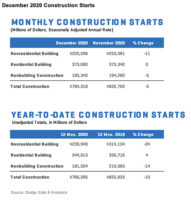Following years of growth since the last recession, the dollar value of total U.S. construction starts is slated to fall 1% in 2019, with a downturn of 4% expected in the upcoming year, according to the 2020 Dodge Construction Outlook. Despite the dip, the economy is in “decent shape,” said Richard Branch, chief economist at Dodge Data & Analytics, presenting the 2020 market update in Chicago on Oct. 31. “We’re not expecting a recession in 2020," he said.
The drop in 2020 will bring total construction starts to $776.4 billion, from 2019’s $808.7 billion, said Branch, noting that his projection is based “on the assumption that some sort of trade agreement is signed with China to forestall an escalation in tariffs.” He added that while the election may add some uncertainty, it is unlikely to have a significant impact on the economy.
Due to the tariffs’ effects on the U.S. manufacturing industry, Branch expects that sector's construction will plunge 29% by year end—after a 25% increase in 2018. The decline is expected to continue in 2020, with a 2% drop.
Residential work is expected to drop 6% overall, with both single family and multi-family housing starts set to decline for the second consecutive year. After reaching $230.1 million in 2018, single family housing construction fell 3% in 2019 and is projected to drop 3% in 2020 as well. Multi-family starts rose 12% in 2018, then fell 9% in 2019, with another 13% drop predicted for next year.
After peaking in 2019, the dollar value of commercial starts is expected to fall across the board, with warehouses and hotels providing the largest downturns, at 10% and 11%, respectively.
Retail starts will fall 6% as online shopping continues to grow in popularity. While office construction is expected to drop 2% overall, Branch notes that data center work is rising. Starts in the first nine months of 2019 added $6.1 billion to the market.
The skilled labor shortage is also a continuing concern approaching 2020. Contractors are able to secure jobs, said Branch, but “don’t seem to have the ability to find skilled labor to get those jobs done.”






Post a comment to this article
Report Abusive Comment